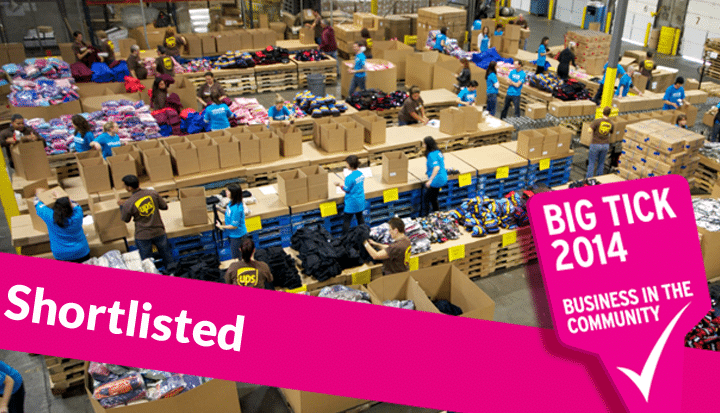UPS’ Humanitarian Relief Programme uses pre-approved funds, Logistics Emergency Teams and their own expertise and supply chains to assist disaster relief efforts around the world.
Social impacts
- UPS made $7.5 million in humanitarian relief funding, technical support and in-kind services in 2013.
- 250 humanitarian shipments across 46 countries were made in 2013 and 16 weeks of humanitarian service given by UPS employees.
- In partnership with Aidmatrix, UPS created the supply chain management platform (SCM4) to improve efficiency in transportation and distribution systems, a system which is now used by other relief agencies.
Business impacts
- Using its technology and people to help communities and businesses recover after disasters helps position UPS as a thought leader in improving response systems and resiliency, and in turn improves UPS’s corporate brand.
- UPS employees who volunteer as first responders utilise and improve their leadership skills and cultivate a strong sense of pride in UPS when they are deployed to disaster areas.
- The UPS Humanitarian Relief Programme enhances the company’s reputation, and increases brand awareness amongst external stakeholders and develops its knowledge of new and existing markets.
“Our commitment to education and training programmes, coupled with our strong expertise in logistics, demonstrates the value we place on equipping individuals and businesses with the skills, information and resources to ensure communities are prepared for the unexpected.”
– Eduardo Martinez, president of The UPS Foundation
UPS’ Humanitarian Relief Programme has addressed many different international disasters over the years, from the floods in Pakistan, Thailand and the Philippines to the famine crisis in the Horn of Africa, to earthquakes in China and Haiti and tsunamis in the Indian Ocean and Japan.
By setting up pre-approved funds at the start of the calendar year, UPS is able to activate them quickly in the immediate aftermath of a disaster. Using their Logistics Emergency Teams (LET) first responder programme, UPS also activates the highly skilled logistic professionals based all over the world. UPS uses its global network of countries and territories to mobilise their employees local to the communities stricken by small-scale disasters.
In 2012/13, UPS responded to Typhoon Haiyan, provided ongoing support for the Syrian refugee crisis and aided long-term recovery efforts for communities affected by Hurricane Sandy.
As a leader in global logistics services, UPS is in the unique position to extend its expertise, transportation assets and global network to assist UN agencies and NGOs across preparedness, relief response and post crisis recovery. UPS has had a long-standing commitment to pre, during and post disaster relief because of its deep roots in communities.
Its Humanitarian Relief Programme is focused on aiding communities in crisis, strengthening partnerships with leading humanitarian relief organisations, helping to build their capacity and increasing collaboration amongst government agencies, non-profit organisations and private sector businesses to create more resilient communities around the world.
“Each year, millions of people are impacted by disasters all over the world. We believe that we can help reduce the human suffering that follows such tragic events through our Humanitarian Relief Programme by collaborating with our partners and helping communities better prepare for unexpected and unplanned events, which is core to our mission. Our commitment to education and training programmes, coupled with our strong expertise in logistics, demonstrates the value we place on equipping individuals and businesses with the skills, information and resources to ensure communities are prepared for the unexpected.”
Over the coming decades it is expected that both the frequency and intensity of international disasters will continue to increase due to multiple factors including climate change, urban migration, population growth and increased scarcity of natural resources. In the aftermath of a disaster, working closely with governments and the humanitarian community, business expertise, products and services can be utilised to reduce risk, build resilience and provide essential relief to communities affected.
The International Disaster Relief Award, supported by DFID, was created this year to recognise the positive action and relief provided in the immediate aftermath of international disasters by businesses.
The companies awarded a Big Tick in this category confirm that businesses have an important role to play in international disaster relief, risk mitigation and preparedness.
Beyond cash donations, each Big Tick company is using its core business resource to respond to international disasters. Collectively these businesses have helped over 2 million beneficiaries, provided 800 skilled volunteers and given 250,000 working days to support international disaster relief. The following examples demonstrate the significant value and impact businesses have made by working in partnership with humanitarian agencies, governments and disaster prone communities.
The case studies profiled in this series with Business in the Community, provide more detail about the programmes that achieved a Big Tick and those shortlisted for the top accolade.
This blog was previously published on Business in the Community and is reproduced with permission.










